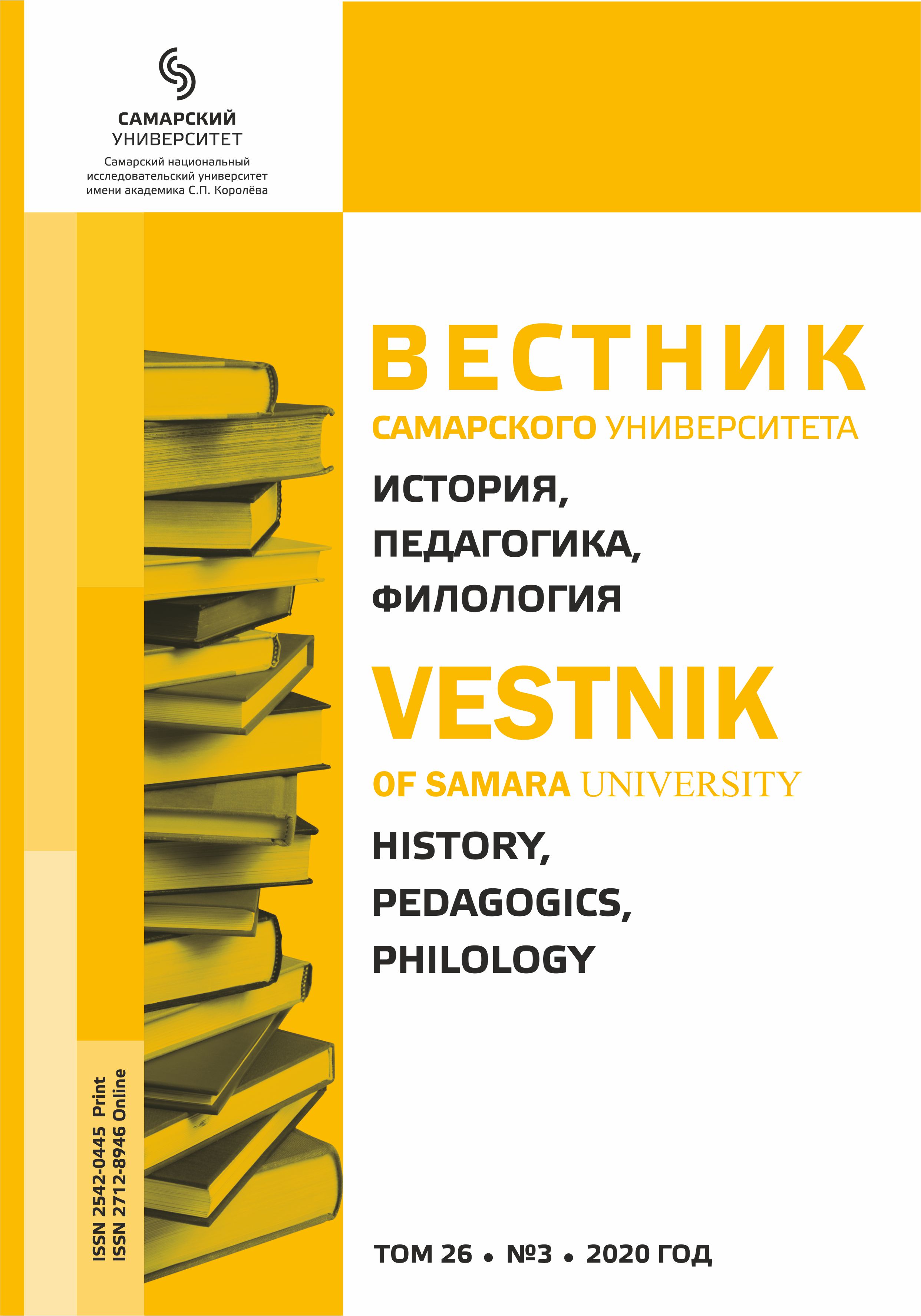Precedent phenomena and stereotypes in the linguo-cultural space: touch points and divergence points
- Authors: Matveyeva А.А.1
-
Affiliations:
- Bashkir State University, Ufa, Russian Federation
- Issue: Vol 26, No 3 (2020)
- Pages: 88-94
- Section: Articles
- URL: https://journals.ssau.ru/hpp/article/view/8191
- DOI: https://doi.org/10.18287/2542-0445-2020-26-3-88-94
- ID: 8191
Cite item
Full Text
Abstract
The article is devoted to the investigation of two types of cultural signs – precedent phenomena and stereotypes. The deepened interest to the processes of intercultural communication, to the things predetermining its success or failure, to the things preconditioning certain evaluation of the communicative behaviour of a cultural community representative, not only defined the rapid development of the linguo-culturological paradigm but also required a re-interpretation of the interrelation between language, culture and mind questions. Precedent phenomena and stereotypes provide a fertile field for the investigation of such questions as the cultural markedness of language signs, cognitive structures verbalization, characteristics providing the commonness of a linguo-cultural space, the variety of aspects of a linguo-cultural personality. The aim of this article is to compare precedent phenomena and stereotypes in order to elicit their common features and differentiation lines. The investigation has been conducted on the English fiction and mass-media material which allowed to educe the ethnocultural connotations of precedent phenomena and stereotypes reflecting some stable representations of objects of reality in the mind of the language speakers. The investigation has revealed that the characteristics common for precedent phenomena and stereotypes include the sociocultural markedness of both cultural phenomena, their suprapersonal character, the reduced and invariant way of keeping in the mind of the linguocultural community representatives, the value-based and deictic character. As the investigation has shown, the differences between precedent phenomena and stereotypes take the lines «emergence – non-emergence», «monoreferentiality – polyreferentiality», «metaphoricity – non-metaphoricity», «degree of behaviour modelling ability».
About the authors
А. А. Matveyeva
Bashkir State University, Ufa, Russian Federation
Author for correspondence.
Email: morenov@ssau.ru
ORCID iD: 0000-0003-2748-4255
Candidate of Philological Sciences, assistant professor, Department of the English Language and Intercultural Communication, Bashkir State University
References
- Lippmann 1922 – Lippmann W. (1922) Public Opinion. New York: Harcourt, Brace. Available at: http://www.gutenberg.org/cache/epub/6456/pg6456-images.html.
- McGarty, Yzerbyt, Spears 2002 – McGarty C., Yzerbyt V., Spears R. (2002) Stereotypes as Explanations. The formation of meaningful beliefs about social groups. Cambridge: Cambridge University Press. Available at: http://catdir.loc.gov/catdir/samples/cam033/2002073438.pdf.
- Bobrova, Kuznetsova 2020 – Bobrova T.O., Kuznetsova E.N. (2020) Metaphorical modeling of national stereotypes: the image of Russia in English-language media. The World of Science, Culture, Education, no. 1 (80), pp. 406–408. doi: 10.24411/1991-5497-2020-00163. (In Russ.)
- Bubnova, Podrezova 2017 – Bubnova I.A., Podrezova D.V. (2017) Allusive name in the individual linguistic consciousness as a symbol of national cultural values. Bulletin of the South Ural State University. Series «Linguistics», vol. 14, no. 1, pp. 5–13. doi: 10.14529/ling170101. (In Russ.)
- Golutvina, Babina 2019 – Golutvina A.V., Babina L.V. (2019) Precedent phenomena use in works of the modern French writers Guillaume Musso, Amelie Nothomb and Bernard Werber. Philology. Theory & Practice, vol. 12, no. 1, pp. 74–79. doi: 10.30853/filnauki.2019.1.16. (In Russ.)
- Gudkov 1998 – Gudkov D.B. (1998) Precedent name in the cognitive base of modern Russian (results of an experiment). In: Krasnykh V.V., Izotov A.I. (Eds.) Language, Consciousness, Communication: collection of articles. Moscow: «Filologiia», issue 4, pp. 82–93. Available at: https://www.elibrary.ru/item.asp?id=23949639; http://www.philol.msu.ru/~slavphil/books/jsk_04_05gudkov.pdf. (In Russ.)
- Ivanova, Chanysheva 2014 – Ivanova S.V., Chanysheva Z.Z. (2014) National cultural precedents in political communication. Political Linguistics Journal, no. 4 (50), pp. 39–47. Available at: https://www.elibrary.ru/item.asp?id=22987011. (In Russ.)
- Krasnykh 2003 – Krasnykh V.V. (2003) At home among strangers: myth or reality? Moscow: ITDGK «Gnozis», 375 p. Available at: https://vk.com/wall-154516093_19414. (In Russ.)
- Lucyachenko 2020 – Luсyachenko I.E. (2020) Stereotypes of public consciousness and the concept of conformism. Herald of KRSU, vol. 20, no. 2, pp. 100–105. Available at: https://elibrary.ru/item.asp?id=42801977. (In Russ.)
- Maslova 2001 – Maslova V.A. (2001) Cultural linguistics: schoolbook for students of higher educational institutions. Moscow: Izdatel’skii tsentr «Akademiia», 208 p. Available at: https://www.gumer.info/bibliotek_Buks/Linguist/maslova/index.php. (In Russ.)
- Nakhimova, Pototskaya 2019 – Nakhimova Ye.A., Pototskaya N.P. (2019) Precedent phenomena in advertisement of beauty industry products on Russian and English advertisements. Current Issues in Philology and Pedagogical Linguistics, no. 4, pp. 140–146. doi: 10.29025/2079–6021-2019-4-140-146. (In Russ.)
- Nikolaeva 2000 – Nikolaeva T.M. (2000) Speech, communicative and mental stereotypes: sociolinguistic distribution. In: Eshich M.B. (Ed.) Language as a means of culture rendering. Moscow: RAN, Nauchnyi sovet po istorii mirovoi kul’tury, In-t slavianovedeniia, pp. 112–131. Available at: https://www.elibrary.ru/item.asp?id=25545074. (In Russ.)
- Stefanenko 1999 – Stefanenko T.G. (1999) Ethnopsychology. Moscow: Institut psikhologii RAN; Akademicheskii proekt, 320 p. Available at: https://www.gumer.info/bibliotek_Buks/Psihol/stef/13.php. (In Russ.)
- Titova 2019 – Titova A.S. (2019) Precedent name matrix as the diachronic (the evolution of the name Plyushkin in the communicative consciousness). Belgorod State University Scientific Bulletin. Humanities, vol. 38 (4), pp. 532–539. doi: 10.18413/2075-4574-2019-38-4-532-539. (In Russ.)
- Chanysheva 2010 – Chanysheva Z.Z. (2010) Stereotypes in the linguocultural paradigm. In: Chanysheva Z.Z. (Ed.) Homo loquens in language, culture, cognition: collection of research papers. On the 70-th anniversary of the birth of Muryasov R.Z. Part. I. Ufa: RITs BashGU, pp. 338–349. Available at: https://elibrary.ru/item.asp?id=22480586. (In Russ.)
Supplementary files













